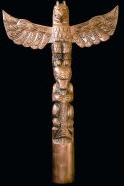 This concept has connected Aboriginal people inextricably to the land and all of creation and into a set of obligations and cultural practices that ensured the conservation of the natural world. All Aboriginal people are related to the species and to the landscape as kin, through the process of being born from a totemic site, as are the species to whom one is related.
This concept has connected Aboriginal people inextricably to the land and all of creation and into a set of obligations and cultural practices that ensured the conservation of the natural world. All Aboriginal people are related to the species and to the landscape as kin, through the process of being born from a totemic site, as are the species to whom one is related.
Through totemism , everything - humans, animals, land, weather (sun, wind, rain), moon, sky, stars - belongs to a conceptual, spiritual and social whole. Thus it is that Aboriginal societies have a culture that accords metaphysical primacy to place rather than time. Thus, while Europeans ignore the Aboriginal notion of being in the world, of connectedness to place, kin, community, all species and the natural world, they have insisted on the perspective of time and history.
 Aboriginal philosophy comes from the time of creation. Great ancestors who were human, animal and bird all at the same time, anthropomorphs, were powerful enough to create order in this chaos. These ancestral heroes are responsible for life itself; life that arose in a time when all the natural species, the land and humans, were part of the same ongoing life force.
Aboriginal philosophy comes from the time of creation. Great ancestors who were human, animal and bird all at the same time, anthropomorphs, were powerful enough to create order in this chaos. These ancestral heroes are responsible for life itself; life that arose in a time when all the natural species, the land and humans, were part of the same ongoing life force.
 Like all human societies, Aboriginal society has operated on a core set of values and beliefs that are complex and that form the basis for religious practice and ways of being and doing. This philosophy constitutes a set of "truths" for people that define the parameters of knowledge, reality and cultural practice.
Like all human societies, Aboriginal society has operated on a core set of values and beliefs that are complex and that form the basis for religious practice and ways of being and doing. This philosophy constitutes a set of "truths" for people that define the parameters of knowledge, reality and cultural practice.
Human culture is learned, shared and complex. It is continually adapting beliefs, values, attitudes, language, patterns of thought and communication, religion and knowledge as well as tools and technology. Adaptation is a human response to changes in the environments in which they live. Aboriginal society has never been static but it has been essentially non-materialist and extremely conservative of the environment.
The colonial encounter has meant that Indigenous cultures, including the Aboriginal people, have been robbed of their integrity and viability by implying that they are not as advanced as that of the colonising power. It has been through the colonial encounter that terms such as primitive, pre-literate, stone age, underdeveloped have been used to imply that Indigenous cultures are simplistic and unworthy. Similarly, Aboriginal religious practice has been characterised as simple, crude and irrational, from a Christian and Eurocentric perspective, and has been variously described by terms such as magic, shamanism fetishism, animism, pre-animism and totemism that often fail to explain its true worth and significance.
In contemporary times, in the context of ongoing colonisation, we tend to measure other cultures against the lifestyles and values of the modern capitalist consumer societies. An alternative would be to measure the worth of societies and their philosophical bases by considering their longevity. A feature of many early civilisations is that they have sealed their own doom by an exploitation of the natural environment. By contrast, Aboriginal civilisation has been notable for its survival over at least 6,000 years.
The key to this survival lies in Aboriginal philosophy, expressed in religious practice that has been paramount in peoples' day-to-day lives, informing all their actions. For any human society: " religion represents a symbolic view of people and their universe which regulates their actions, supports them in crisis, orders their lives, gives their actions meaning and validity - it represents their conception of the world".
For Aboriginal people, this is embodied in the canon left by the supreme being who created the landscape, all species and humans, transmitted in an oral culture and commonly known in English as "the law".